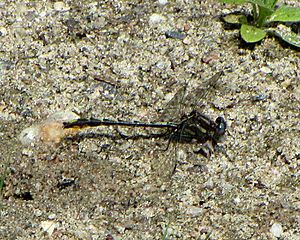Lancet clubtail facts for kids
Quick facts for kids Lancet clubtail |
|
|---|---|
 |
|
| female | |
| Conservation status | |
| Scientific classification |
|
| Kingdom: | Animalia |
| Phylum: | Arthropoda |
| Class: | Insecta |
| Order: | Odonata |
| Infraorder: | Anisoptera |
| Family: | Gomphidae |
| Genus: | Phanogomphus |
| Species: |
P. exilis
|
| Binomial name | |
| Phanogomphus exilis (Selys, 1854)
|
|
| Script error: The function "autoWithCaption" does not exist. | |
Script error: No such module "Check for conflicting parameters".
The lancet clubtail (scientific name: Phanogomphus exilis) is a type of dragonfly. It belongs to a family of dragonflies called Gomphidae. These amazing insects are quite common. You can find them across southern Manitoba and Ontario in Canada. They also live in the northeastern United States.
Contents
What Does the Lancet Clubtail Look Like?
Lancet clubtail dragonflies are not very big. Adult dragonflies are about 4.3 centimeters (1.7 inches) long. That's about the length of a small finger!
Colors and Markings
Their bodies are mostly black. They have bright green stripes on their thorax. The thorax is the middle part of an insect's body. It's where the wings and legs are attached.
They also have green triangles on their abdomen. This is the long, tail-like part of the dragonfly. The last two parts of their abdomen have yellow spots on the sides.
Why "Lancet Clubtail"?
The name "lancet clubtail" comes from the male dragonfly. Male lancet clubtails have special parts called "claspers." These claspers are shaped like a lancet. A lancet is a small, pointed surgical knife. This unique shape helps identify them!
Where Do They Live and When Are They Active?
Lancet clubtails are found in many places. They like areas with water, like rivers and lakes. They are common in their habitat.
Flight Period
These dragonflies are active during the summer. You can usually see them flying from June to July. This is their main flight period. During this time, they fly around looking for food and mates.
Is the Lancet Clubtail in Danger?
The lancet clubtail is not currently in danger. Scientists check on animal populations to make sure they are safe. This helps protect different species.
Conservation Status
The conservation status of the lancet clubtail is "Least Concern" (LC). This means there is no immediate threat to this dragonfly. Its population is stable. Experts reviewed its status in 2018. They found that it is doing well.


